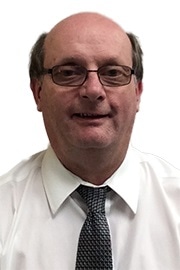 Interview conducted by Mychealla RiceFeb 20 2017
Interview conducted by Mychealla RiceFeb 20 2017In this interview, Brian Sayers, Product Manager from Solartron Analytical talks to AZoM about their four new Apps-XM Series. Four new focused products that are competitive on size, price and save valuable lab space for today's leading edge scientific applications.
Please can you give a brief overview of the company and the work you do?
Solartron Analytical was acquired by Ametek in September 2005. Solartron has a long history in precision measurement. The company started in 1947, and rapidly advanced to develop high accuracy measurement equipment for mission critical aerospace applications.
Products have included pioneering developments in the field of spectrum and frequency response analysis equipment, techniques that continue to be developed for use in today’s electrochemistry and materials analysis research equipment.
Solartron Analytical’s key focus has and will always be, to develop the very best, most innovative, highest performance reference grade measurement equipment for use in today’s leading edge scientific applications. Solartron’s XM identifier (signifying “Xtreme Measurement”) is applied as a badge of honour to its latest range of equipment that now includes the Apps-XM products.
My main responsibility at Solartron Analytical / Ametek is for the development of innovative products that are closely targeted to customer needs and fit well with our overall market strategy for the Solartron brand.
I have a strong belief in product innovation, bringing products that are very well differentiated into the market. Previous Solartron Analytical products, including ModuLab XM, were very well differentiated (unique) products, and this will continue to be the direction for future products that are currently in development.
Why did Solartron Analytical decide to develop the four new models?
We recognized that many customers have specific applications that require a very accurate reference grade system, but do not require that level of flexibility. If their application is energy and will always be energy, why have a system that is able to test high impedance corrosion coatings, or anodize samples at 100 volts?
For those customers we needed a more targeted approach to allow them to benefit from smaller profile units (less bench space needed), and from the lower costs that accompany not having to test all of those product configurations that will never be needed for their application.
That was the start of the Apps-XM idea. A series of focused products for particular applications that have the same renowned XM accuracy but are priced competitively and take less space.
We are receiving positive feedback worldwide about these systems and the early indication is that these products will be very successful in their respective markets.
.jpg)
How do the new Apps-XM Series differ from previous models?
Apps-XM models are specifically targeted at particular applications instead of being general purpose products. The products are therefore more easily understood, occupy less bench space and are competitively priced.
What are the major advantages of the new Apps-XM Series?
Size - These models have smaller footprint so they occupy less laboratory space. That is an important consideration these days where space is often at a premium. These units require about one half or one third of the bench area of our general purpose models.
Price – These models are specifically targeted at particular applications. For that reason, we are able to increase production volume of models that are exactly the same rather than being differently configured for each unit that is shipped. That gives cost efficiencies in production that translate into better prices for customers.
Accuracy – There is no compromise in system accuracy. They are produced to the same exacting standards and rigorous testing that is applied to our general application models such as the widely acclaimed ModuLab XM series of products.
What are the primary applications that the Apps-XM Series can be utilised in?
Four models and four different applications:
EnergyLab XM is targeted at battery, fuel cell and supercapacitor research. The system has a built-in high bandwidth 2A power booster (higher current can be added by external boosters up to 100 Amp). Anode/Cathode DC and EIS analysis is built in using differential auxiliary electrodes.
EchemLab XM is designed for a wide range of electrochemical applications. Its built-in high voltage amplifier is uniquely able to polarize a cell at up to ±100 Volts which makes the unit very well suited to organic as well as anodization applications. High voltage and current is available by adding external boosters.
SolarLab XM is for testing solar cells (including Perovskites and Dye Sensitized Solar Cells – DSSC). The system is provided complete with optical bench consisting of various light sources, beam splitter, photo detector and sample holder. The system runs all standard solar cell test protocols including I-V, IMPS, IMVS (and as an option IPCE); as well as a wide range of electrochemical tests using its built-in high performance XM potentiostat and frequency response analyzer.
Materials Lab XM is designed for testing materials such as piezoelectrics, ferroelectrics, semiconductors, ceramics etc. It provides a wide range of test techniques for sample characterization that include I-V, pulse, staircase, EIS, Mott-Schottky, impedance and capacitance. It is able to switch mode instantly between time domain and AC techniques and interfaces with furnaces and cryostats to provide a complete solution.
.jpg)
Which industry’s will primarily benefit from Solartron’s four new Apps-XM Series models?
The four models are each specifically targeted, but taking these together a very wide range of industries is covered from Energy (lithium battery research, Solid Oxide Fuel Cells), Electrochemistry including coatings and anodization research, Solar including Perovskite, DSSC and for materials including piezoelectric, semiconductor, polymers etc.
Whether customers are doing fundamental research or research targeted at specific applications in industry, there is sure to be one or models that will be of interest, and the good thing is that these all have the same high performance XM accuracy of our ModuLab XM system, but are budget and lab space friendly.
Which model is best suited to Photovoltaics (PV) research? Why?
SolarLab XM is particularly suited to PV tests as it has a built-in driver for light sources and photodetector, as well as optical bench that is included in the price. The software is photoechem variant of XM-studio software is highly targeted at PV applications with multiple preconfigured experiments that are ready to run out-of-the-box.
What sets the MaterialsLab XM apart from other models? What benefits would researchers see?
There are many impedance analyzers and LCR (inductance, capacitance, resistance) meters on the market, but these are typically only provide AC measurements. The difference for Materials Lab XM is that this unit is able to combine time domain and impedance measurements in a single unit – without switching cables.
For ferroelectric materials, that means that hysteresis and impedance measurements can be taken using the same connections to the sample.
A wide range of temperature controller drivers are included with the system allowing furnaces, ovens or cryostats to be automatically controlled from the same XM-studio software.
Which model is best suited for targeting coatings and corrosion?
EchemLab XM is well suited to these measurements as it has sensitive current measurement combined with high voltage stimulus (up to 100 Volts). This can be extremely useful is anodization applications where coatings are deposited and tested using impedance techniques at the same high voltage.
What is in store for the future of Solartron Analytical?
More exciting products are on the way. It is too early to take about these but it is certain that Solartron Analytical will continue to innovate and lead the field in electrochemical and materials research.
Where can our readers go to find out more?
The Apps-XM products are fully featured on the Ametek website.
About Brian Sayers
My background is in electronics (BSc Hons Electrical and Electronic Engineering - Leeds University, UK). I have been involved in engineering development, sales management and marketing in my time at Solartron so I have a wide experience of all aspects of the business.
Having an electronics background allows me to bring something different to this market. Whether our customers are measuring semiconductors, corrosion coatings, dielectrics, batteries or fuel cells, this always equates to measurements of voltage and current sometimes in extreme circumstances.
My electronics measurement background enables me to translate customer requirements into products – I have a unique feel for what is needed and what is possible. My keen interest is to develop products that are innovative and well differentiated from other products on the market.
Disclaimer: The views expressed here are those of the interviewee and do not necessarily represent the views of AZoM.com Limited (T/A) AZoNetwork, the owner and operator of this website. This disclaimer forms part of the Terms and Conditions of use of this website.